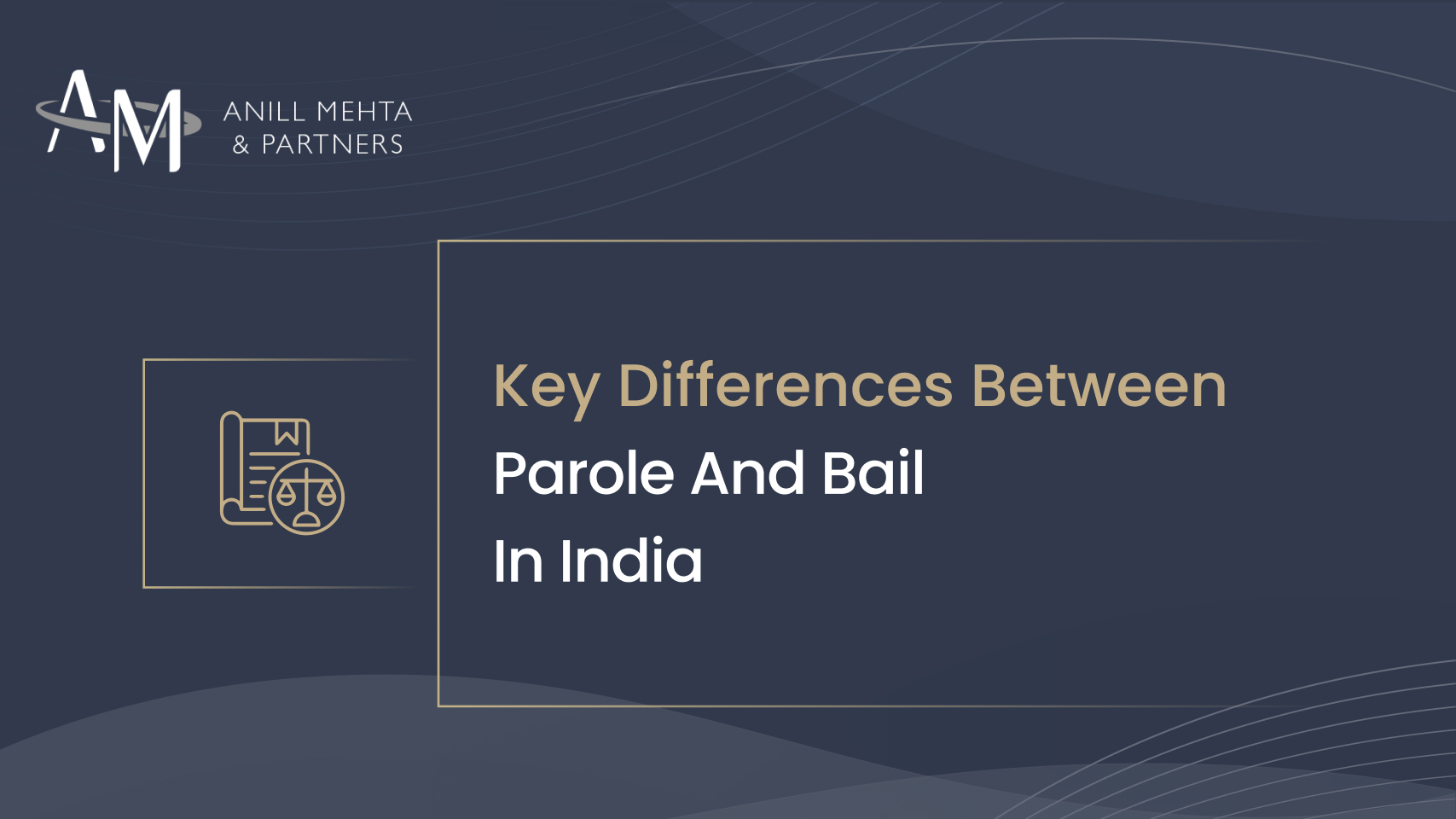Getting to know the difference between parole and bail is important in understanding criminal law. The two terms tend to be merged, but these two have drastically different functions. Although both bail and parole are reliefs to the convicts, bail is given before trial, and parole is given after conviction.
According to the records of the National Crime Records Bureau (NCRB), there were over 4.3 lakh under-trials in prisons across India as of the end of 2023. Many of them were on bail or were comparatively poor in terms of legalities. On the other hand, parole requests are fewer, and they are dependent on jail behaviour.
In this blog, you will know the literal meaning, aim, eligibility, and legal framework of bail vs parole. This guide will explain the distinction between parole and bail for students, litigants, and those interested in the subject.
What is Bail?
Bail is the system that allows an accused person to be out of custody before a trial or other legal action. It is not a mode of acquittal, only an interim release.
Indian forms of bail:
- Regular Bail: This is the one given to the person who is already taken into custody.
- Interim Bail: Temporary bail released before the hearing of a regular bail.
- Anticipatory Bail: Under Section 438 of the CrPC, this is granted before arrest.
Why Bail?
- To protect the freedom of an individual.
- To secure the accused so that he/she is present during the trial.
- To avert pre-conviction detention that could be avoided.
Who grants bail? Sessions courts and Judicial Magistrates. In special situations, the High Courts and the Supreme Court.
Key Points:
- The Code of Criminal Procedure (CrPC) deals with bail.
- The judge determines the quantity and circumstances under which bail is given.
- It may be revoked in case the defendant breaks the freedom of it.
What is Parole?
Parole refers to the authorization given to an inmate that alleviates some of his penalty following the completion of a period of his sentence. It is a privilege rather than a right that is provided under certain rules and regulations.
Forms of Parole in India:
- Custody Parole: A temporary release that allows time in cases such as a death or marriage within the family.
- Regular Parole: An extended time parole is granted for good behavior, typically for family or personal reasons.
Purpose of Parole:
- To get the prisoner to be integrated back into society easily.
- To allow prisoners to address urgent personal or family matters.
- As a reward for good behaviour within the prison.
Who grants Parole? Parole Boards and Jail Superintendents. In some cases, the State Government has a say.
Key Points:
- The states have their manuals on parole.
- It can be canceled at any time in case it is abused.
- He or she is still under the process of supervision.
Key Differences Between Bail and Parole
| Factors | Bail | Parole |
|---|---|---|
| Legal Stage | Before conviction | After conviction |
| Governing Law | CrPC chiefly Sections 437–439 | State Jail Manual / Prison Act |
| Nature | Temporary release of the accused | Conditional release of a convict |
| Authority | Law court | Jail authority / State Govt |
| Objective | Protect liberty till the trial ends | Reintegrate the convict into society |
| Eligibility | Accused, not yet proven guilty | Convict with good conduct |
| Duration | Until trial or judgment | Short duration (a few days to months) |
| Conditions | May vary by case | Strict monitoring & supervision |
Legal Provisions Related to Bail and Parole in India
Bail: The Legal Provisions
- Section 436 CrPC: Bail in case of offences punishable with imprisonment.
- Section 437 CrPC: Non-bailable offences bail.
- Anticipatory bail under Section 438 CrPC.
- Section 439 CrPC: Bail Powers of High Court or Sessions Court.
Parole: The Legal Provisions
- Prison Act, 1894.
- State Jail Manuals.
- Supreme Court Judgments: Directions on eligibility and misuse.
Purpose and Objective of Bail and Parole
Purpose of Bail:
- Secure human freedom.
- Avoid jail congestion.
- Provide due process of law.
- Prevent the detention of innocent people.
Purpose of Parole:
- Make good behaviour in prison rewarding.
- Aid during emergencies.
- Assist prisoners in family and social life.
- Prepare inmates for re-entry into society.
Conditions and Eligibility for Bail and Parole
Conditions and eligibility for bail:
- Must not tamper with evidence.
- Must not intimidate witnesses.
- Must be present on every court date.
- Not available for serious offences like terrorism or repeat offenders.
Conditions & Eligibility for Parole:
- Proper behavior in prison is obligatory.
- No parole in heinous crimes like rape, terror, or dowry death.
- Requires proof of emergency (for custody parole).
- Regular parole only after serving a minimum sentence period.
Conclusion
In India’s criminal justice system, understanding the difference between parole and bail is critical. Both work to provide temporary freedom of custody; they differ in legal jurisdictions.
Bail allows an accused to stay out of jail before conviction and enjoy the right to be free. Parole is, instead, partial freedom of a convict depending on the behavior and circumstances.
Hence, awareness of the difference between parole and bail is not just legal knowledge but a civic responsibility. In either situation, it is essential to know your legal rights.
